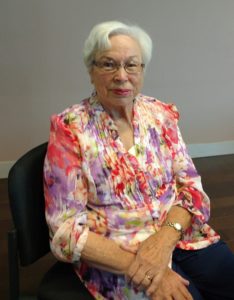Anishinabek Elder receives nomination for the Order of Ontario

By Colin Graf
AAMJIWNAANG FIRST NATION—An Elder from the Aamjiwnaang First Nation has been nominated for the Order of Ontario, in tribute to her work creating awareness of the history and legacy of the residential school system.
Geraldine Robertson, 81, has been nominated by the United Church of Canada for the province’s highest award.
Robertson has travelled across Canada, speaking about her experiences in the residential school system, and helping others to speak about their own experiences openly.
“We see her as a role model, not only for her community, but for the whole country,” said Reverend Kate Crawford of the Huron Shores United Church in Grand Bend, Ontario, who began the nomination process.
Crawford first met Robertson during a blanket exercise held at her church and as she got to know the Elder, Crawford said Robertson’s total involvement in the reconciliation movement revealed itself gradually.
“[She is] a person of great humility who would never push herself forward,” Crawford says of Robertson.
“[The people of Aamjiwnaang are] so very proud of our special Elder Geraldine for sharing her story with many communities for years now,” said Aamjiwnaang Chief Joanne Rogers. “Geraldine believes by telling her story, it will encourage others to do, so that they may, perhaps, begin the healing journey.”
“[Robertson] speaks of her time in residential school by opening with one or two humorous incidents, engaging the listener with her warmth and laughter,” explains Reverend Cheryl-Ann Stadelbauer-Sampa, executive secretary of the United Church’s London Conference, in a letter supporting Robertson’s nomination. “Then with gentleness and insight, she draws the listener more deeply into the residential school experience and the heartbreak it caused and consequences it created.”
Reverend Cheryl-Ann Stadelbauer-Sampa says Robertson’s story-telling is “both personal and universal. She provides people with an opportunity to know the residential school history in a way that connects it with current issues and with the Calls to Action of the Truth and Reconciliation Commission.”
Robertson remembers the first time that she spoke publicly about her younger days was to her Chief and Council in 1995, when she realized the effects of residential schools were causing her generation to have trouble raising their own children. After that she began speaking to regional and national gatherings of United Church leaders, writes Stadelbauer-Sampa.
Robertson added that her travels have taken her as far as British Columbia.
“The fact some people say I deserve that [award] it means a lot, regardless of whether I get it or not,” Robertson says.
The speeches she has given and the workshops she has helped lead are all intended to help stop the suffering the residential legacy has passed down to this day.
“The devastating part is the intergenerational pain,” notes Robertson. “This is something that still needs to be addressed. People need to keep talking about this.”
“Around 20-25 people receive the Order of Ontario each year out of a typical 200 or more nominations each year,” says Colleen Moran, program lead with the Ontario Honours Secretariat. “An advisory Council reviews them in the summer and the honorees are announced typically in December.”
The United Church is aware of the profound and painful impact residential schools have had on Indigenous people, and according to Stadelbauer-Sampa and church members, they are “grateful for the countless times Geraldine has chosen to talk when she might have preferred silence; to relive heartache when she might have protected herself against pain; to shine a light on suffering when she could have skirted that darkness; and to offer warmth and laughter along with tears and sorrow.”


